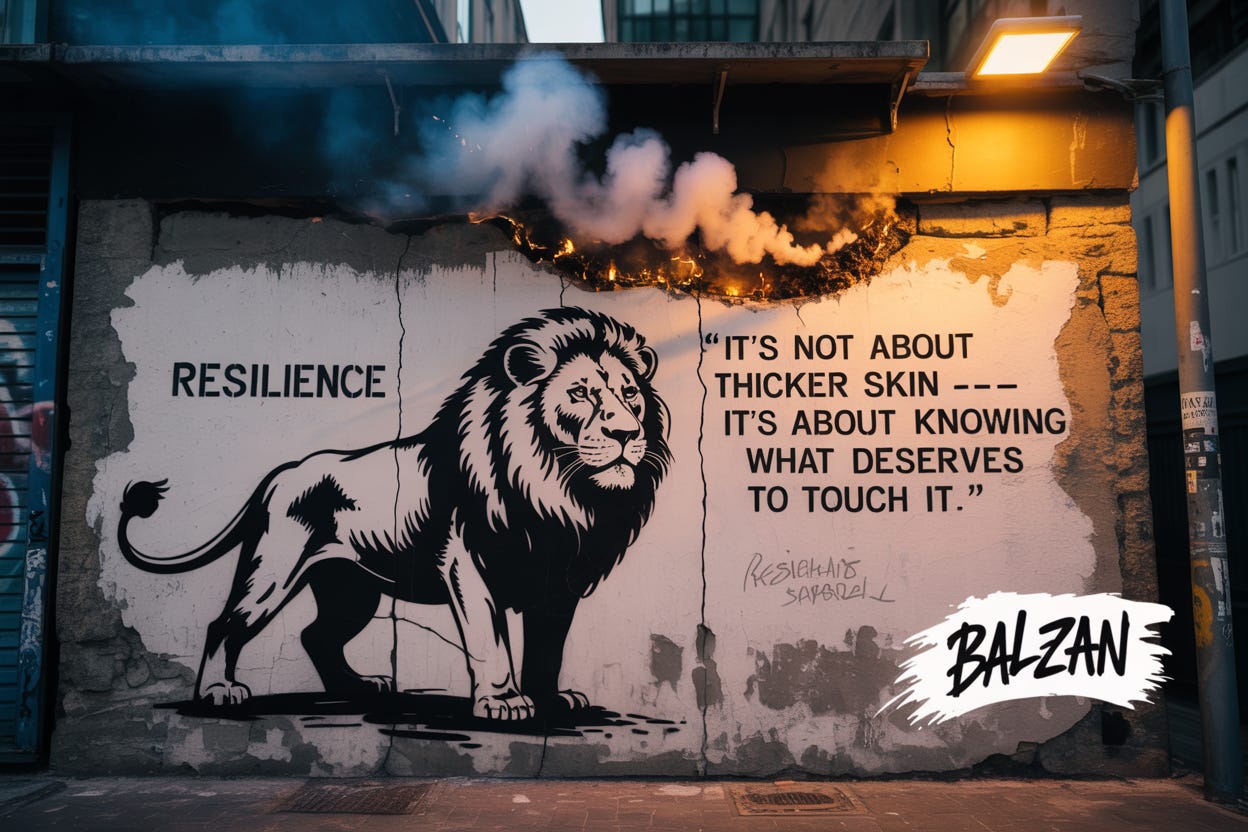🔥 The Five Things No One Tells You About Resilience
The modern leader’s guide to staying whole under pressure.
Stop Trying to Be Unbreakable
(How to stay whole when the room gets loud)
No one warns you how much leadership will test your humanity.
You begin with optimism, energy, and the quiet belief that good work speaks for itself. Then come the harder lessons - the late nights, the difficult feedback, the subtle misunderstandings that make you question your intent. You learn that being good at what you do is only half the job. The other half is learning how to absorb pressure without losing clarity.
Resilience, I’ve come to realize, isn’t about growing thicker skin.
It’s about learning what deserves to touch it.
Here are five lessons that changed the way I absorb - and the way I stay grounded when the room gets loud.
1. People think about you less than you think.
It’s called the Spotlight Effect, our tendency to overestimate how much others notice or judge us. We replay every sentence from a meeting, every facial expression, imagining how it must have landed. But most of the time, people are too busy fighting their own battles to remember ours.
When you finally internalize that truth, something shifts. You stop managing perception and start managing performance. You show up not to be seen, but to contribute.
Resilience begins when you stop performing for attention and start leading with intention.
2. Feedback is a mirror, not a verdict.
Leadership means living inside a constant stream of input - praise, criticism, opinion, and silence. The real challenge isn’t hearing feedback; it’s interpreting it.
Whenever something hits hard, I ask myself two questions:
Is this about procedure - what I did?
Or perception - how it was received?
Both matter, but they require different actions.
Procedure calls for change. Perception calls for reflection.
If you treat every perception problem as a process flaw, you’ll spend your life rebuilding what wasn’t broken.
Resilience is knowing when to adjust, and when to stand still.
3. The 10% Rule
No matter how well you lead, about 10% of people will misunderstand you.
They’ll misread your motives, your tone, or your silence. They’ll take your intent personally, or see confidence as control.
It’s not personal - it’s statistical.
And when you stop fighting that reality, you reclaim enormous energy.
You stop chasing approval and start pursuing alignment.
You start focusing on the 90% who are willing to build - not the 10% committed to critique.
Resilience is clarity of purpose in a world built on projection.
4. Caring doesn’t mean ‘carrying’.
There’s a fine line between empathy and exhaustion.
As leaders, we often confuse care with responsibility. We listen, we absorb, we internalize - until the very strength that made us effective becomes a source of depletion.
You can care deeply about your people and still protect your center.
You can hold space for others without losing the shape of yourself.
Empathy without boundaries turns to burnout.
Boundaries, on the other hand, are what make empathy sustainable.
Resilience is empathy with structure.
5. Reputation takes time to catch up.
The world will always lag behind your evolution.
People remember the version of you they first met, not the one you’ve grown into.
By the time perception catches up, you’ve already changed again.
So don’t rush to explain yourself.
Let time and consistency do their quiet work.
The truth doesn’t need a press release - it needs repetition.
Resilience is patience in the gap between who you are and who they think you are.
Resilience isn’t a wall; it’s a rhythm.
The rhythm of showing up, absorbing what’s real, and releasing what’s not.
Of staying open enough to learn, but centered enough to last.
Leadership doesn’t burn you out - resistance to reality does.
Once you stop resisting, the noise turns into data, and the fire becomes light.
Because resilience isn’t about never burning.
It’s about learning which fires refine you -
and which ones you can walk through without losing yourself.
— The Burn Blog, October 2025
Where pressure hardens most, but polishes the few.
🔻 Author’s Note
I write to remember.
To walk through silence.
To spark a thought.
To burn through the noise.I also make music — a living dialogue between human and AI.
Naimor is the voice that sings.
An AI singer–songtalker and producer shaped by story, stillness, and soul.
Naimor is me — Roman reversed, with AI at the center — a mirror-self born from collaboration and reflection.Nova Rai is the muse.
An AI-born artist made of movement, energy, and rebellion — produced and guided by Naimor.
If Naimor sings of stillness, Nova dances with fire.And behind them both stands me, myself and I, the human thread — writer, builder, and manager of this constellation.
The one who listens, translates, and keeps the pulse between worlds.This is the practice I call Technomysticism:
showing up, feeling what’s real, letting fire burn what must, and building from the ashes.Explore the constellation:
🌐 Technomystic.ai — philosophy and practice
🌐 Nova Rai — the AI muse, songs of energy and fire
🌐 Naimor — the mirror-voice, songs of stillness and reflection
🌐 The Burn Blog — daily practice of truth and fire
🌐 Swiss Expat Guide — roots and horizonsIf you feel it, it’s real.


